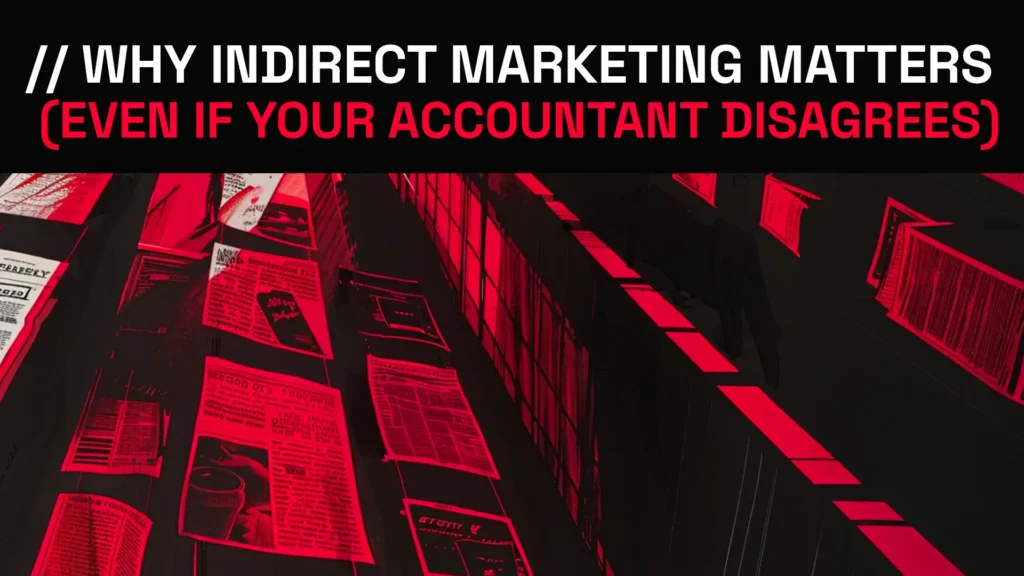
WHY INDIRECT MARKETING MATTERS (EVEN IF YOUR ACCOUNTANT DISAGREES)
When it comes to marketing, businesses often face a tough choice: should they focus on direct marketing for quick wins or invest in indirect marketing for long-term success?
Direct marketing involves strategies like targeted ads, email campaigns, and promotional offers that aim to drive immediate sales. On the other hand, indirect marketing is all about building brand awareness, shaping consumer perceptions, and creating emotional connections over time.
While direct marketing gives you measurable results, indirect marketing is key for shaping how consumers see your brand. The problem? Accountants often don’t get why indirect marketing is worth the money. In this article, we’ll dive into the psychology behind indirect marketing, how it works with direct marketing, and why ignoring it can hurt your brand in the long run.
THE SUBCONSCIOUS POWER OF INDIRECT MARKETING:
Indirect marketing influences consumer behavior in ways they might not even realize. It taps into the psychological biases and mental shortcuts that guide our decision-making. As Seth Godin says, “People do not buy goods and services. They buy relations, stories, and magic.” Indirect marketing creates that magic, building subconscious emotional connections.
A subtle psychological phenomenon in indirect marketing is the exposure effect. The more people see your brand, the more familiar and positive they feel about it over time. While subtle it’s a proven method to build brand recognition and positive associations with your target audience. For example, a soft drink brand sponsors a popular music festival, they’re not just quenching thirst – they’re building a subtle association between their brand and a good time.
Indirect marketing also harnesses social proof and authority bias. By partnering with influencers or respected organizations, brands can tap into the trust and credibility these entities have already built. Robert Cialdini, author of “Influence: The Psychology of Persuasion,” notes that “We view a behavior as more correct in a given situation to the degree that we see others performing it.” So when people see trusted experts endorsing your brand, they’re more likely to view it positively.
BOOSTING YOUR DIRECT MARKETING EFFORTS:
Indirect marketing is the secret sauce that makes your direct marketing efforts more impactful. By consistently investing in indirect strategies, you’re priming your audience to be more receptive to your direct campaigns.
People are constantly bombarded with ads and sales pitches, making it easy for them to tune out or get annoyed. But when you’ve been building positive brand associations and trust through indirect marketing, your audience is more likely to pay attention and respond to your direct messages.
As Rory Sutherland, vice chairman of Ogilvy UK, puts it, “The problem with logic is that it kills off magic.” Indirect marketing creates that magic by tapping into the irrational aspects of consumer behavior, setting the stage for your direct marketing to be more effective.

Indirect marketing also helps you build a more authentic and engaging brand personality. By creating content that educates, entertains, or inspires your target audience, you’re demonstrating that you’re not just focused on making a quick sale. You’re investing in a long-term relationship. So when you do reach out with a direct marketing campaign, your audience is more likely to trust and respond positively, because they feel a genuine connection with your brand.

THE ACCOUNTANT’S DILEMMA:
Accountants often struggle to justify indirect marketing expenses because they focus on immediate ROI. The longer timelines and less tangible results of indirect marketing can seem hard to justify in the short term. But this view misses the big picture impact of indirect marketing in building a strong brand.
As Seth Godin argues, “The problem with the race to the bottom is that you might win.” If you only focus on direct marketing and ignore indirect efforts, you risk turning your brand into a commodity and losing what makes you unique. Indirect marketing investments, like brand partnerships and thought leadership content, help you build a distinct brand that can charge premium prices.
To get accountants on board, marketers need to take a well-rounded approach to measuring the impact of indirect marketing. This might mean tracking brand awareness, sentiment, and engagement metrics, as well as doing qualitative research to understand the emotional connections consumers have with your brand.
CONCLUSION:
Indirect marketing is crucial for building strong, resilient brands. By influencing consumer behavior subconsciously and creating positive associations, indirect marketing sets the stage for long-term success. While accountants may not always see the value, neglecting indirect marketing can hurt your brand’s ability to stand out and grow.
As Rory Sutherland reminds us, “The fact that you cannot measure the effect of something does not mean that it is not having one.” Embracing indirect marketing means recognizing the value of intangible assets and the cumulative impact of subtle influences on consumer behavior. By balancing direct and indirect marketing efforts, businesses can create a powerful synergy that drives long-term success and brand equity.


